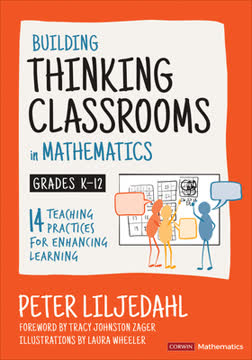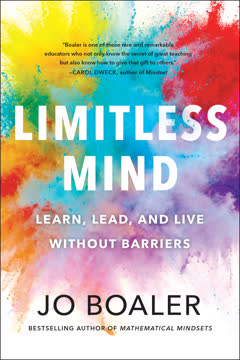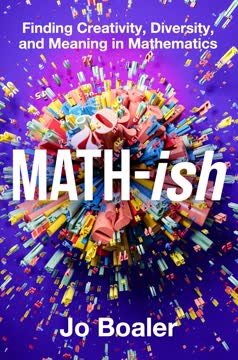Key Takeaways
1. Neuroplasticity: The Foundation of Limitless Potential
Every time we learn, our brains form, strengthen, or connect neural pathways.
Brains are adaptable. The groundbreaking discovery of neuroplasticity reveals that our brains are not fixed, but constantly changing and reorganizing throughout our lives. This adaptability means that we all have the potential to learn anything, regardless of perceived limitations or past experiences. This challenges the long-held belief that some people are simply "not good" at certain subjects.
Evidence from research. Studies on London taxi drivers, who undergo intense spatial training, show significant growth in the hippocampus, the brain region responsible for spatial and mathematical thinking. Similarly, children who have had half of their brains removed have demonstrated the remarkable ability of the remaining hemisphere to adapt and take over the functions of the missing side. These examples highlight the brain's incredible capacity for change.
Implications for education. Understanding neuroplasticity is crucial for educators, parents, and learners alike. It encourages us to reject fixed-ability thinking and embrace a growth mindset, recognizing that intelligence and potential are not predetermined but can be developed through effort and targeted learning strategies. This knowledge empowers us to approach challenges with optimism and persistence, knowing that our brains are capable of adapting and growing.
2. Embrace Mistakes and Struggle for Brain Growth
The times when we are struggling and making mistakes are the best times for brain growth.
Mistakes are valuable. Contrary to traditional beliefs, mistakes are not something to be avoided but rather embraced as opportunities for brain growth. Neuroscience research shows that when we make mistakes, our brains are more active, forming new neural connections and strengthening existing ones. This process of error correction is essential for learning and skill development.
The science of struggle. Deliberate practice, characterized by working at the edge of our understanding and making frequent mistakes, is the key to developing expertise. This type of practice, often described as "targeted, error-focused," promotes the formation of myelin, a substance that insulates nerve fibers and increases the speed and efficiency of neural signals.
Creating a mistake-friendly environment. To foster growth, it's crucial to create learning environments that encourage mistakes and celebrate struggle. Teachers and parents can help by reframing mistakes as learning opportunities, providing constructive feedback, and emphasizing the importance of effort and persistence over innate ability. This shift in perspective can empower learners to embrace challenges and view setbacks as stepping stones to success.
3. Beliefs Shape Reality: The Power of Mindset
When we change our beliefs, our bodies and our brains physically change as well.
Mindset matters. Our beliefs about our abilities have a profound impact on our potential. People with a growth mindset, who believe that intelligence and talent can be developed, are more likely to embrace challenges, persist through setbacks, and achieve at higher levels than those with a fixed mindset, who believe that abilities are predetermined.
The body-mind connection. Research shows that our beliefs can even affect our physical health. Studies have found that people who believe they are getting more exercise are healthier, even if their actual activity levels are the same. Similarly, positive beliefs about aging are associated with increased longevity.
Cultivating a growth mindset. We can cultivate a growth mindset by:
- Recognizing and challenging fixed-mindset thoughts
- Praising effort and progress over innate ability
- Embracing challenges and viewing setbacks as learning opportunities
- Surrounding ourselves with positive influences and role models
By changing our beliefs, we can unlock our potential and create a more positive and fulfilling reality.
4. Multidimensional Learning: Connecting Brain Networks
Neural pathways and learning are optimized when considering ideas with a multidimensional approach.
Engage multiple senses. Learning is most effective when we engage multiple senses and brain networks. This means approaching concepts from different angles, using visuals, models, stories, and real-world applications to create a richer and more interconnected understanding.
Brain communication. Neuroscience research shows that different areas of the brain are responsible for different types of thinking, such as numerical, spatial, and verbal. When these areas communicate with each other, learning is enhanced.
Practical strategies. To promote multidimensional learning, teachers and parents can:
- Encourage students to represent concepts in different ways (e.g., drawing diagrams, writing stories, building models)
- Connect abstract ideas to real-world examples
- Use a variety of teaching methods to cater to different learning styles
- Promote discussions and collaborations to expose students to diverse perspectives
By stimulating multiple brain networks, we can create deeper and more lasting understanding, fostering creativity and problem-solving skills.
5. Flexibility Over Speed: The Key to Deep Understanding
Speed of thinking is not a measure of aptitude. Learning is optimized when we approach ideas, and life, with creativity and flexibility.
Speed is not intelligence. Our society often equates speed with intelligence, particularly in mathematics. However, research shows that speed is not a reliable indicator of aptitude. In fact, some of the most brilliant thinkers are slow and deliberate, taking their time to deeply understand concepts.
The downside of timed tests. Timed tests can create anxiety and hinder performance, particularly for students who are not naturally fast thinkers. These tests often assess memorization rather than understanding, discouraging deeper engagement with the material.
Embrace slow thinking. To foster deep understanding, we need to prioritize flexibility and creativity over speed. This means:
- Encouraging students to explore different approaches to problem-solving
- Valuing thoughtful explanations over quick answers
- Creating a classroom culture that celebrates mistakes and encourages risk-taking
By shifting our focus from speed to depth, we can create a more equitable and effective learning environment that empowers all students to reach their full potential.
6. Collaboration: Unlocking Potential Through Connection
Connecting with people and ideas enhances neural pathways and learning.
Social learning. Learning is not a solitary activity but a social one. Collaboration with others exposes us to diverse perspectives, challenges our assumptions, and deepens our understanding.
Benefits of collaboration:
- Increased engagement and motivation
- Improved communication and problem-solving skills
- Enhanced creativity and innovation
- Greater empathy and understanding of others
Creating collaborative environments. To foster collaboration, teachers and leaders can:
- Design group projects that require interdependence and shared responsibility
- Encourage students to share their thinking and provide constructive feedback
- Create a classroom culture that values diverse perspectives and celebrates collective success
By fostering collaboration, we can create learning environments that are more engaging, equitable, and effective, empowering individuals to reach their full potential.
7. Living Limitlessly: A Journey of Continuous Growth
It is impossible to live without failing at something, unless you live so cautiously that you might as well not have lived at all—in which case, you fail by default.
Continuous growth. The journey to living without limits is not a destination but a continuous process of growth and self-discovery. It involves embracing challenges, learning from mistakes, and constantly seeking new knowledge and experiences.
Key principles for limitless living:
- Embrace neuroplasticity and believe in your potential to learn anything
- Cultivate a growth mindset and view setbacks as opportunities for growth
- Seek out diverse perspectives and engage in collaborative learning
- Prioritize deep understanding over speed and memorization
- Embrace uncertainty and be willing to take risks
The power of choice. Ultimately, living without limits is a choice. It's a decision to reject limiting beliefs, embrace challenges, and pursue our passions with courage and determination. By embracing this mindset, we can unlock our full potential and create a life that is both meaningful and fulfilling.
Last updated:
FAQ
What's Limitless Mind about?
- Neuroplasticity Focus: Limitless Mind by Jo Boaler explores neuroplasticity, the brain's ability to change and adapt throughout life, emphasizing that our brains are not fixed.
- Challenging Beliefs: It addresses damaging beliefs about intelligence, particularly in math, arguing these stem from societal messages and educational practices.
- Growth Mindset: Boaler introduces six keys to learning that promote a growth mindset, encouraging readers to embrace mistakes as essential parts of learning.
Why should I read Limitless Mind?
- Transformative Insights: The book offers groundbreaking insights into how beliefs about learning shape reality, providing strategies to overcome self-limiting thoughts.
- Research-Based Evidence: Boaler combines personal anecdotes with scientific research, making the content relatable and credible.
- Applicable to All Ages: The principles can be applied to various life aspects, encouraging lifelong learning and adaptability.
What are the key takeaways of Limitless Mind?
- Neuroplasticity is Key: Learning is a dynamic process that can happen at any age, forming and strengthening neural pathways.
- Embrace Mistakes: Mistakes are opportunities for brain growth, highlighting the importance of viewing challenges as development opportunities.
- Multidimensional Learning: Engaging with content through various methods enhances brain connectivity and fosters deeper understanding.
What are the best quotes from Limitless Mind and what do they mean?
- "Everything you’ve ever wanted is on the other side of fear.": Overcoming fear and self-doubt is essential for achieving personal goals.
- "We are not born with fixed abilities.": Challenges the myth of fixed intelligence, promoting the belief that effort leads to success.
- "Mistakes grow your brain.": Encourages viewing errors as a natural and beneficial part of learning.
What is neuroplasticity, and why is it important in Limitless Mind?
- Definition: Neuroplasticity is the brain's ability to reorganize itself by forming new neural connections throughout life.
- Learning Implications: Understanding neuroplasticity empowers individuals to believe in their capacity to learn and grow.
- Real-Life Applications: The book provides examples of harnessing neuroplasticity in educational settings to improve learning outcomes.
How does Limitless Mind address the fear of failure?
- Reframing Failure: Failure is a stepping stone to success, with mistakes seen as growth opportunities.
- Research Support: Studies show that struggling and making mistakes are the best times for brain growth.
- Building Resilience: Changing the narrative around failure helps develop resilience and a growth mindset.
What are the six keys to learning presented in Limitless Mind?
- Neuroplasticity: Understanding that our brains can change and grow is fundamental to embracing a growth mindset.
- Embracing Mistakes: Mistakes are essential for learning and should be welcomed as part of the process.
- Multidimensional Learning: Engaging with content through various methods enhances understanding and retention.
- Collaboration: Working with others fosters a supportive learning environment and encourages diverse perspectives.
- Positive Self-Beliefs: Cultivating a belief in one’s ability to learn is crucial for overcoming challenges.
- Lifelong Learning: Embracing the idea that learning is a continuous journey opens up endless possibilities for personal growth.
How can educators apply the concepts from Limitless Mind in the classroom?
- Encourage Growth Mindset: Foster a classroom environment that promotes a growth mindset by praising effort and resilience.
- Use Multidimensional Approaches: Incorporate various teaching methods to engage students and cater to different learning styles.
- Create a Safe Space for Mistakes: Establish a culture where mistakes are seen as valuable learning opportunities.
How does Limitless Mind address the concept of a growth mindset?
- Defining Growth Mindset: A growth mindset is the belief that abilities can be developed through effort and learning.
- Impact on Learning: Adopting a growth mindset can lead to improved academic performance and personal development.
- Practical Strategies: Boaler provides strategies for fostering a growth mindset, such as embracing challenges and viewing failures as growth opportunities.
What role does neuroscience play in Limitless Mind?
- Understanding Brain Plasticity: The brain is capable of change and growth throughout life, known as neuroplasticity.
- Effects of Stress and Anxiety: Stress and anxiety can negatively impact learning by impairing working memory.
- Learning Through Struggle: Neuroscience research supports the idea that struggle is beneficial for brain development.
How can I apply the concepts from Limitless Mind in my own life?
- Adopt a Growth Mindset: Change your self-talk and beliefs about your abilities, reminding yourself that effort leads to improvement.
- Embrace Mistakes: View mistakes as valuable learning experiences rather than failures.
- Engage in Collaborative Learning: Seek opportunities to work with others, enhancing understanding and allowing for diverse perspectives.
How does Limitless Mind address the issue of math anxiety?
- Identifying Causes: Timed tests and speed-based learning are significant contributors to math anxiety.
- Changing Perspectives: Promotes the idea that everyone can learn and succeed in mathematics.
- Practical Solutions: Offers strategies for reducing math anxiety, such as creating a supportive learning environment and emphasizing understanding over speed.
Review Summary
Limitless Mind receives mostly positive reviews for its inspiring message about the brain's capacity for growth and learning. Readers appreciate Boaler's research-backed insights on embracing struggle, valuing mistakes, and adopting a growth mindset. Some find the book repetitive or misleading in its title, as it focuses heavily on math education. Critics argue that the concept of a "limitless" mind is overstated. Overall, many readers find the book motivational and applicable to various aspects of learning and personal development.
Similar Books







Download PDF
Download EPUB
.epub digital book format is ideal for reading ebooks on phones, tablets, and e-readers.







